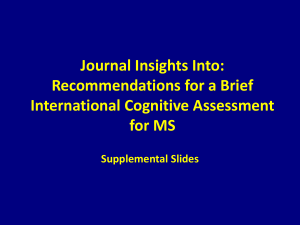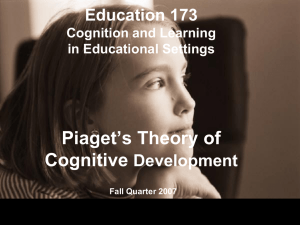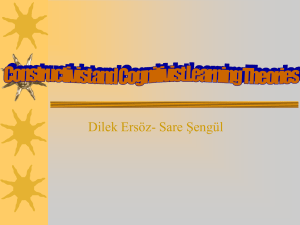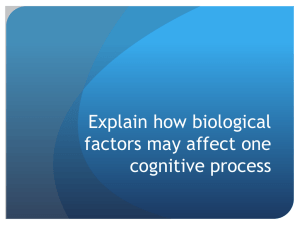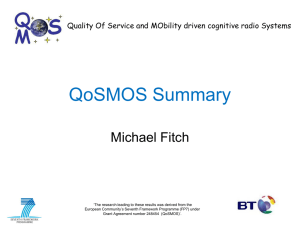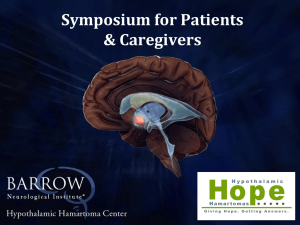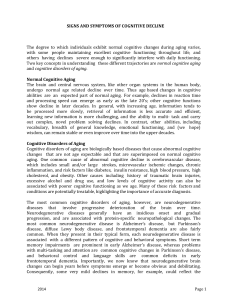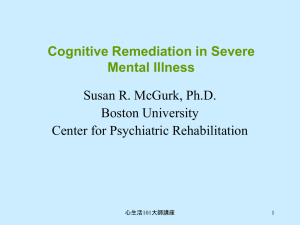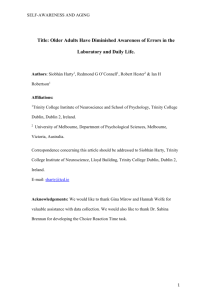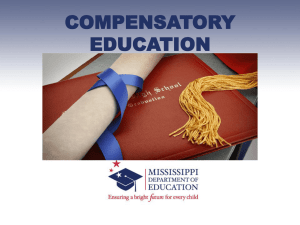Compensatory and Restorative Approaches
advertisement
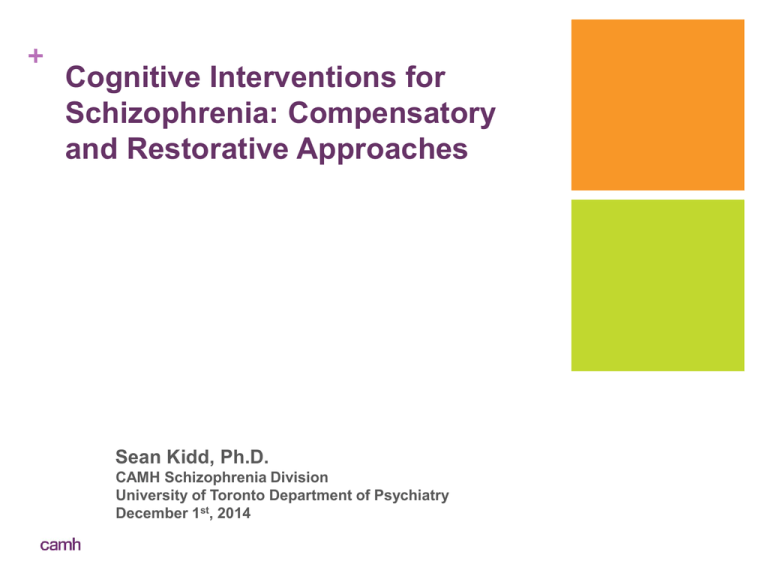
+ Cognitive Interventions for Schizophrenia: Compensatory and Restorative Approaches Sean Kidd, Ph.D. CAMH Schizophrenia Division University of Toronto Department of Psychiatry December 1st, 2014 + Funders and Collaborators Dawn Velligan and Natalie Maples – University of Texas at San Antonio Jaswant Kaur – George Brown College Rohan Ganguli, Tony George, Yarissa Herman, Kwame McKenzie, Gursharan Virdee *There are no competing interests in the work presented + presentation overview: a tale of two approaches What is promising What is problematic What is next + some general background Tools are available for addressing positive symptoms (delusions, hallucinations). But, we have little to offer for cognitive impacts and negative symptoms + cognitive impacts Attention Memory Problem Social Solving Cognition + what to do about it? + 1. enhance Practice cognitive tasks A variable literature (types of tasks, adjunct intervention) Linking to “real world” contexts and challenges important + people working in CR research Susan McGurk – Boston U Til Wykes – London Institute of Psychiatry Matthew Kurtz - Yale Bruce Wexler – Yale Chris Bowie – Queen’s U Alice Medalia - Columbia + cognitive remediation – the evidence Psychosis symptoms (highly variable, .28 avg) Neurocognition (.41) Psychosocial functioning (.35) Gains are sustained Benefit over comparable tasks Little link between outcome and intervention duration + an example – George Brown College Built into academic curriculum Group and individual computer exercises + matching with McGurk + + the pilot – summer 2010 People like it! Turned up and stayed Improved Kidd, S.A., Kaur Bajwa, J., Haji-Khamneh, B., McKenzie, K., & Ganguli, R. (2012). Cognitive Remediation for Individuals with Psychosis in a Supported Education Setting: A Pilot Study. Journal of Rehabilitation Research and Practice, 2012, 1-5. + the rct Same intervention model Randomized 19 in term 1 to CR+SE, 18 to SE Cognitive battery, PANSS, Self Esteem, academic functioning Baseline, up term 1 end, term 2 end follow + rct findings Again people liked it, only 1 person dropped out Cognition improved for both groups, but no improvement for CR PANSS Self – no change for either group Esteem (.44) sustained at f/u Academic: More term 1 completers (.74), at f/u better contributions, attitude etc. (.64-.75) + challenges and what comes next Bang for the buck and seeing evidence through the hype Dismantling Better screening Better bridging and focus Considering setting + Compensatory Approaches + Compensatory Approaches Some overlap, but emphasize: Compensatory strategy rather than improving function Home and non-treatment/education contexts + cognitive adaptation training (CAT) - described Focus primarily on medication taking and basic functional domains Builds from assessment Intensive – typically 9 months + 2. adapt - cognitive adaptation training + + cat – the evidence Compared to control conditions, clients receiving CAT Psychosis Symptoms (mostly ns) Lower relapse rates (65% versus 19% over 19 months) Higher levels of adaptive functioning (1.00) Most consistently, better medication adherence (approx 1.00) Not for everyone + + the revision 9 months Intensive CAT 4 months, with 5 months case manager follow up Eval – baseline, 4 months, 9 months Symptoms (BPRS, NSA), functioning MCAS, SOFAS, GAS N = 23 + the outcomes It worked, people liked it Symptoms: BPRS .41 - .24; NSA .33 - .33 Functioning: + the challenges Bedbugs Time and travel + next steps Family CAT Inpatient CAT + where do we go from here? + considering... Sequencing/staging in care pathways approaches Better screening and providing individualized care Linkages: CBT, CBSST, MBCT/SR, Supported Voc and Ed, family intervention, concurrent disorders tx The tool is as only good as the person using it – common factors and fidelity + a decent summary paper McGurk, S.R., Mueser, K.T., Covell, N.H., Cicerone, K.D., Drake, R.E., Silverstein, S.M., Medalia, A., Myers, R., Bellack, A.S., Bell, M.D., Essock, S. M., 2013. Mental health system funding of cognitive enhancement interventions for schizophrenia: Summary and update of the New York Office of Mental Health Expert Panel and Stakeholder Meeting. Psychiat Rehab J. 36 133-145.

